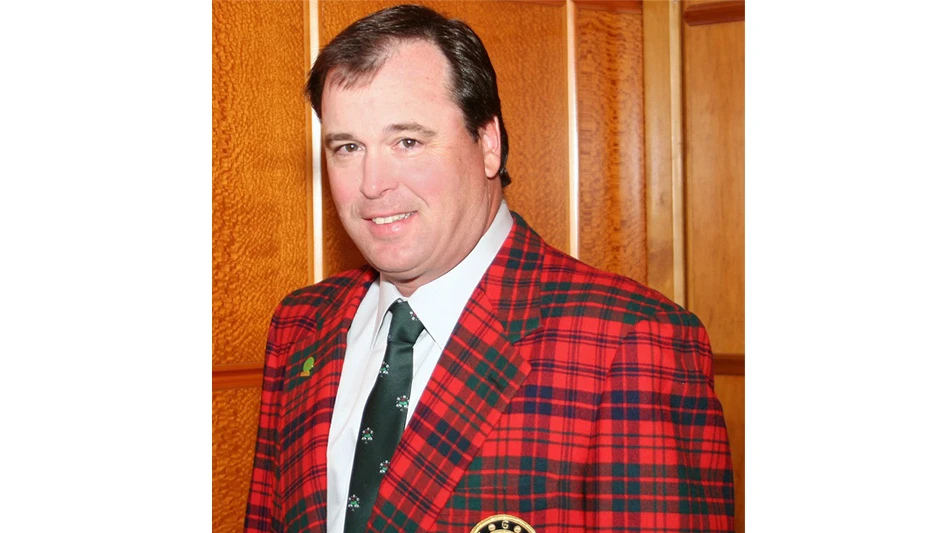The finishing holes of life offer each of us, if we’re healthy and socked away a few bucks, the chance to do things we dreamed about during the working years. Those things are popularly called the “bucket list.” Superintendent careers are intense, family responsibilities always come first and money is usually tight. So when the time comes to retire, also comes the opportunity to get in gear and fulfill some of your dreams.
Cheryl and I took our second genealogy trip to Europe in June. We were gone three weeks and traveled to Sweden, Germany and France. My wife is half Swedish, and she felt very emotional as we visited villages and churches of her not so distant ancestors. It’s difficult to describe the feeling of standing at the fount in a 12th century church where one of her grandfathers was baptized. That scene was repeated several times, and always included a stone church of a similar age. It also included many Swedish people who were anxious to help us find answers to her questions.
I couldn’t miss the contrast of old churches and cathedrals with how we tear down buildings, often after only a few decades. There are a lot of things Americans aren’t smart about, and that is one of them. Southwest Sweden is mostly forested, and her family left to work in the forest and furniture industry in western Michigan. We can now write the story of her family.
Four years previous, we traveled to Cornwall, Scotland and Norway. As proof that I really am an American mutt, a trip to Germany was required to finish the story of my immigrant ancestors. The Muellers came here from Leipzig, Germany. I had dug deeply to learn about them, and, frustrated, finally contacted a German genealogist. I wanted to know exactly where in Leipzig they lived and worked, and he informed me I had a pipe dream: “If we even could learn that information, it could take 25 years and thousands of dollars.” We opted instead to study an 1840 artist rendering of an aerial view, and realized even then it was a big city. We turned our attention to Leipzig itself, its history and the Bach Festival going on that week.
The trip to Oberkaufungen, Germany, was more fruitful, and I came home with confirmation of the family that left there in the 1830s. Also, since we are only a year away from the 500th anniversary of the Reformation, we visited Martin Luther sites that will be packed next year.
Our visit to Germany and France had to include some World War II history. Nobel laureate Elie Wiesel, the Holocaust survivor and witness and author, passed away shortly after we got home. We were grateful we had visited the German concentration camp KZ Buchenwald near Weimer. It was a difficult long day, and that was amplified when we learned that Wiesel had been imprisoned there.
We could clearly see the remaining differences between the old East and West Germany, and when we visited eastern France, World War II was once again prominent. My uncle was killed at the age of 20 in the Vosges Mountains as a rifleman in the 100th Infantry Division. That was in mid-November 1944, and he was buried in a U.S. military cemetery at Epinal, France. After four years, my grandparents had him brought home and buried in our hometown cemetery. But he had rested during that time in the Epinal cemetery and I am the only family member to have now visited it.
We went from eastern France to Normandy, spending three days learning as much as we could about June 6, 1944 and subsequent weeks. That, too, was emotional and included a trip to La Havre, France, where another uncle landed post-D-Day. He lived to tell about it, but didn’t say anything about it until 15 years ago when I sat with him for hours taking notes. He walked across that part of Europe as an infantry scout and was in Trier, Germany, when the surrender came.
One thing missing from this trip that was front and center on our previous trip to Europe – golf. We saw only a sign to a golf course in Sweden, didn’t see a sign or any other evidence of a course in Germany, and drove by one course in eastern Normandy in France. It was a radical change from Scotland and Cornwall where it seemed there was a golf course every few miles.
Some might wonder why anyone would care about a trip I took. I would! But my hope is to convey the wonderful things that can be part of retirement if you do consistent and careful planning. If you do, you can visit all 50 state fairs or all the major-league ballparks. You can try to play all the top 100 golf courses and even just play golf every single day. You can do just about whatever you want. Good luck!

Explore the August 2016 Issue
Check out more from this issue and find your next story to read.
Latest from Golf Course Industry
- Melrose leadership programs sending 17 to GCSAA Conference and Trade Show
- Maximizing your experience at trade shows: tips and etiquette for attendees
- Tubac’s Rancho 9 re-opens after greens renovation
- Future Leaders Academy set for Jan. 23 in suburban Pittsburgh
- 54, Turfgrass set to manage Druids Glen, Curracloe Links
- Nufarm introducing new products in San Diego
- Envu Superintendent Grant Program sending 10 members to 2025 GCSAA show
- Editor’s notebook: Let’s chat about AI





